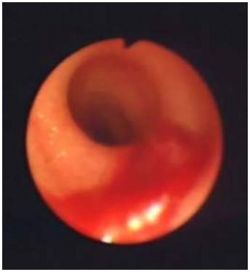Oesophagitis
| This article has been peer reviewed but is awaiting expert review. If you would like to help with this, please see more information about expert reviewing. |
Typical Signalment
- Any age group can be affected
- Young animals with congenital hiatal hernias
- Cats are more prone to doxycycline-associated oesophagitis
- Cats suffering from oesophageal stricture
- Anaesthesia
- Poor positioning during anaesthesia
Description
Oesophagitis in an inflammatory disorder of the oesophagus that usually involves the mucosa but can involve the deeper layers of the submucosa and muscularis. It can take the form of acute or chronic. The disease process occurs after disruption of one of the barrier defence mechanisms and can lead one or several of inflammation, ulceration and erosion of the underlying structures. The most common causes are:
- chemical injury following swallowing
- oesophageal foreign bodies
- gastro-oesophageal reflux
Diagnosis
Clinical Signs
include:
- regurgitation
- salivation
- neck extension during swallowing
- odynophagia
- food avoidance
- aspiration pneumonia (wheezes, coughing)
- ptyalism
- anorexia
Laboratory Tests
Generally unremarkable but may show:
- leucocytosis
- neutrophilia
Diagnostic Imaging
Survey radiographs: generally normal. Signs of aspiration pneumonia may be seen in ventral lung lobes. It can be better differentiated using barium-contrast studies which may show:
- an irregular mucosal surface
- narrowing
- a dilated oesophagus
- oesophageal hypomotility
Endoscopy: To better diagnose oesophagitis, endoscopy with biopsies can be used. Severe oesophagitis will be seen with an oedematous mucosa that is hyperaemic, ulcerated and actively bleeding, whilst less severe cases may require several mucosal biopsies to diagnose the condition.
Treatment
Mild oesophagitis:
- withdraw oral food for 2-3 days and manage as an outpatient.
More severe oesophagitis:
- may need admitting to the hospital, Nil Per Os and animal may require enteral or parenteral nutritional support.
Drugs:
- oral sucralfate suspension
- gastric acid secretory inhibitors (e.g. ranitidine, omeprazole) can be useful in cases of gastro-oesophageal reflux
- broad spectrum antibiotics in animals with sever oesophagitis or aspiration pneumonia
- analgesics
Prognosis
Mild oesophagitis has a good prognosis whereas ulcerative oesophagitis and animals suffering from aspiration pneumonia have a more guarded prognosis.
References
Hall, E.J, Simpson, J.W. and Williams, D.A. (2005) BSAVA Manual of Canine and Feline Gastroenterology (2nd Edition) BSAVA
Merck & Co (2008) The Merck Veterinary Manual
